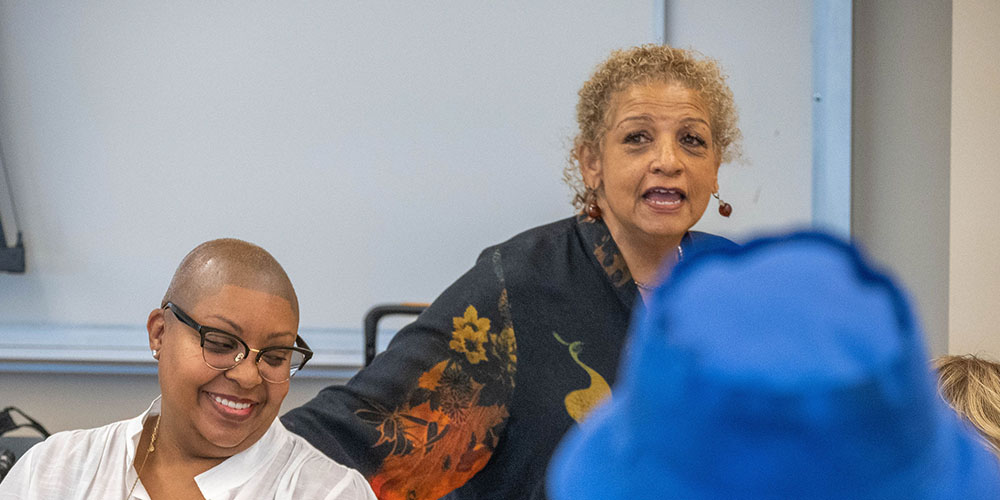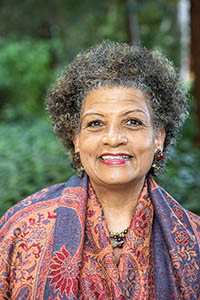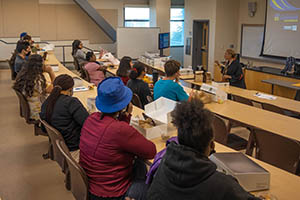
Dr. Beverly Scott (right) (Photos courtesy of Dr. Beverly Scott)
California Forward is committed to advancing policy intersections that create a more inclusive and sustainable California where all people can prosper. The Voices of Shared Prosperity series amplifies the stories of Californians who are committing their time and talent to solutions that embrace equity, environmental sustainability, and economic opportunity.
After decades of working to improve our infrastructure, Dr. Beverly Scott, CEO and founder of Introducing Youth to American Infrastructure, Inc. (IYAI+), now encourages young people, especially BIPOC and underserved students, to explore careers in critical infrastructure sectors that also help build communities.
 “I have been privileged to be in the business of community building,” said Scott. “Infrastructure is a business – it is agnostic. It’s the values, people, and priorities that make the decisions about who gets a railroad, where the bus will go, who gets a park, or where a housing development gets built. All of those decisions and more are decisions that are made by the people in infrastructure sectors at all levels.”
“I have been privileged to be in the business of community building,” said Scott. “Infrastructure is a business – it is agnostic. It’s the values, people, and priorities that make the decisions about who gets a railroad, where the bus will go, who gets a park, or where a housing development gets built. All of those decisions and more are decisions that are made by the people in infrastructure sectors at all levels.”
One of Dr. Scott’s primary objectives through IYAI+ is to increase American competitiveness, sustainable outcomes, and “shared prosperity.” The program is a vehicle to expose high school students to the various different sectors of infrastructure as well as viable career options following certifications. A resident of Alameda County, Scott influences statewide and national policy.
IYAI+ recently revealed its Gateway to Opportunity partnership with the San Bernardino Valley College MESA (Math, Engineering and Science Achievement) program. The project is designed to connect major critical infrastructure public and private sector owners and operators, key regional and national partners, and stakeholders; and interested community-based organizations.
While Scott is a veteran senior executive and the recipient of numerous national awards for her work — including being appointed to the National Infrastructure Advisory Council (NIAC) and named a “Transportation Champion of Change” by the Obama Administration — she insists “there is a very big difference between personal accomplishment and collective success.” This sentiment is exemplified through her approach to infrastructure development as a vehicle for community and economic development.
Scott began her career in academia, earning her doctorate in political science from Howard University. She recalls teaching government and public affairs to graduate students when a former professor mailed her an application to apply for the Carnegie-Houston Fellows Program. Scott was selected as one of four leading academics selected to work in municipal government sectors to find solutions for shifting economies, societies, and environments domestically and internationally.
With a one-year-old son, Scott began the Fellowship program. Her career in infrastructure took off from there. She opted to work in the transportation industry because she viewed it as an important opportunity to be represented in this arena and to make impactful advancements for many people’s daily lives.
 Scott identified the need to increase and train a new workforce in critical infrastructure sectors, especially as these sectors continue to experience large-scale retirements with Baby Boomers, but she notes that these jobs are not for everyone. She explained that while everyone will not go into a career in infrastructure, it is important to be aware of how these industries impact daily life and community outcomes. She encourages young people to build what she refers to as “their civic muscle,” and be active participants in the development of their communities even if they do not choose careers in infrastructure.
Scott identified the need to increase and train a new workforce in critical infrastructure sectors, especially as these sectors continue to experience large-scale retirements with Baby Boomers, but she notes that these jobs are not for everyone. She explained that while everyone will not go into a career in infrastructure, it is important to be aware of how these industries impact daily life and community outcomes. She encourages young people to build what she refers to as “their civic muscle,” and be active participants in the development of their communities even if they do not choose careers in infrastructure.
An ardent proponent for substantial increases in “people development and investment” at all levels, Scott highlights a widespread lack of diversity in the infrastructure sectors. She provided some recommendations to changing these outcomes:
Increase Investment in Career and Technical Education – Reintroduce vocational education in schools and create more pathways for career technical education for adult learners. She highlights that 80% of the jobs in the country’s transportation sector do not require college degrees but they require highly skilled workers, according to data from the Transportation Learning Center. Referring to one of the findings outlined in the NIAC Workforce Talent Management Study, she highlights the urgent need to support active coordination between the public and private sector as well as education and labor.
| According to CA FWD’s California Dream Index, over 2 million students enrolled in the California community college system in the 2019-20 school year. Of those almost 45,000 completed a noncredit career and technical education or workforce preparation course. |
|---|
Increase Value for the People-Side of the Business – “We must bring the same laser focus to the quality of life for the people who support the daily operations of capital improvement projects and cyber assets. We must have broader thinking about infrastructure,” Scott exclaims. She says that executives should be able to speak about the skills, retirement rates, and training investments of their labor force with the same detail that they are able to discuss the physical assets and projects of their organization.
Remove White-collar and Blue-collar Terminology – She refers to the future workforce as “gray-collar,” noting that many of the skills needed for jobs in the future require a high level of skill. She applauded Governor Newsom’s investment and focus on career technical education and supports continuing these efforts in the state and broadening these efforts on a national level.
With over 40 years of experience, it is the value of community that keeps her committed to her work in infrastructure. Scott vehemently supports systemic-level, personal spheres of influence, and community-based changes to increase broad social and economic advancement opportunities.
The Voices of Shared Prosperity stories will be shared in advance of the 2022 California Economic Summit taking place in Bakersfield on October 27-28.

